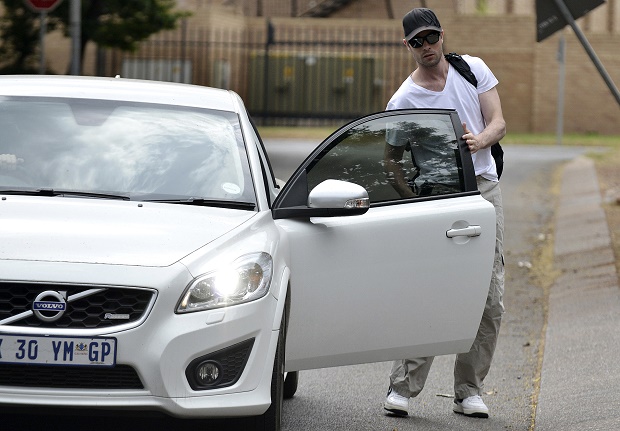Oscar Pistorius: from Olympic fame to murder appeal

In this Saturday Nov. 14, 2015 file photo Oscar Pistorius reports for community service at the Garsfontein police station in Pretoria, South Africa while under house arrest. An official says a top South African appeals court is finalizing a decision on whether to send Pistorius back to prison by overturning a lower court’s manslaughter conviction and finding the double-amputee Olympian guilty of murdering girlfriend Reeva Steenkamp. AP Photo
PRETORIA, South Africa—Oscar Pistorius, the South African amputee sprinter who shot his girlfriend dead, on Thursday faces an appeal court ruling on whether he will be convicted of murder.
Here is a snapshot of events that began more than two years ago with the shooting on Valentine’s Day.
2013
February 14: South African police arrest Pistorius, a Paralympic and Olympic sprinter nicknamed the “Blade Runner,” for killing model Reeva Steenkamp, 29, who was shot four times with one of the guns at his Pretoria house.
February 15: Pistorius bursts into tears as he is charged, denying murder “in the strongest terms.”
February 19: Pistorius claims in an affidavit that he mistook Steenkamp for an intruder and feared that someone had crept into his home. He fired through a locked bathroom door in what prosecutors term a “premeditated” murder.
February 20: Police searching Pistorius’s home find testosterone and needles in a dresser in his bedroom. Testosterone is on the list of substances banned by the International Olympic Committee. Pistorius’s lawyers poke holes in the prosecution’s murder case, challenging flawed police work.
February 22: Pistorius is granted bail.
March 11: Pistorius is in deep mourning, but is “certainly not suicidal,” his family says.
2014
February 14: A year after the shooting, Pistorius says he is still consumed with “sorrow” in an online message.
February 25: A judge rules that most of his trial can be broadcast live, but not his testimony.
March 3: The trial opens in Pretoria before an army of journalists from around the world, with the testimony of a neighbour who tells the court she heard “terrible screams” from a woman.
March 13: Pistorius vomits when a picture of the dead model’s body is flashed on the court’s television screens.
April 7-15: Pistorius takes the witness stand and begins with a tearful apology to Steenkamp’s family. This is followed by five days of often intense cross-examination, marked by bouts of tears and breaks in the session. Pistorius steadfastly denies any intention to kill Steenkamp.
June 30: After a six-week break, a panel of three psychiatrists and a psychologist conclude that Pistorius does not suffer from mental illness.
September 12: Pistorius is found guilty of culpable homicide or manslaughter, but is initially cleared of murder.
October 21: Judge Thokozile Masipa sentences Pistorius to a maximum of five years in jail. The athlete is immediately taken to Pretoria prison.
November 4: Prosecutors describe the sentence as “shockingly light and inappropriate” in appeal papers.
December 10: The judge grants prosecutors leave to appeal against the conviction for culpable homicide rather than murder.
2015
October 19: Pistorius is allowed out of prison—just one year into his five-year jail term—to spend the remainder of his sentence under house arrest at his uncle’s mansion in Pretoria. He is let out a day ahead of his release date in an apparent bid to avoid media attention.
November 3: The Supreme Court of Appeal reserves judgement on state prosecutors’ attempt to have him convicted for murder.
November 14: Pistorius reports for his first day of community service in Pretoria.
December 3: The Supreme Court of Appeal is to announce its decision on whether he should have been convicted of murder.
RELATED STORIES
Mother of Pistorius’ girlfriend delivers daughter’s speech
Oscar Pistorius released from prison, put under house arrest